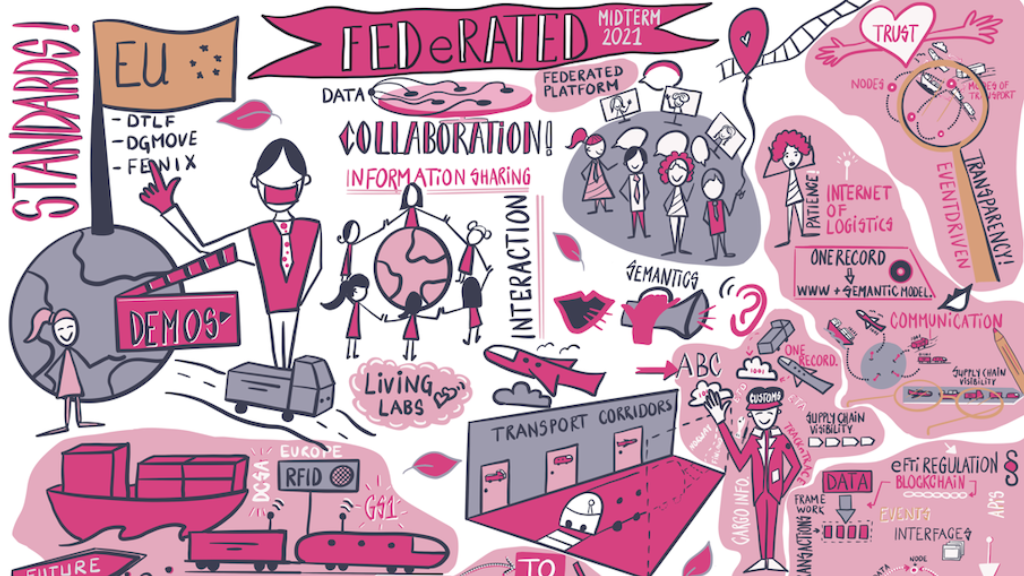FEDeRATED Unveils Masterplan to Revolutionize EU Logistics with AI and Supply Chain Visibility
IF FEDeRATED has its way, all logistics chain operators and law enforcement agencies in the EU will soon be able to access the power of pull based data availability and value added services, i.e. artificial intelligence, within the supply chain. The FEDeRATED Masterplan provides them guidance to maximize supply chain visibility and situational awaerenass, optimize asset capacity and infrastructure use, making digital technology accessible to all operators while enabling them to develop new services. The reduction of administrative burdens and supply chain resilience would be additional benefits.
From Nuorgam in the North of Finland down to Tarifa in Spain, and Cabo de Roca in Portugal (West) to Tsarevo in Bulgaria (East), a data sharing infrastructure provision for logistics will be unfolded. Key elements: decentral and open source. The purpose is to enable operators to digitally connect, to discover market opportunities and also to keep watch over the transport of goods and services from production site to retail outlet through connectivity between individually owned IT systems. These IT systems will be tailored to function as nodes within a data infrastructure provision allowing secure data availability to authorized data users introducing M2M monitoring of the delivery times of transport operations, cargo handling, transport emissions and compliance of legal obligations. The data to be shared – containing information on visibility, identity, business documents, ordering and planning – will also feed a machine learning model that is designed to develop services, such as to measure emission, to assess possible risks and to predict the efficiency of freight transport operations. Daily, operators will receive tailor made messages informing them of the status of their transport delivery time, emissions, possible safety incidents and supply chain disruptions.
The introduction of this data sharing infrastructure provision should rather not be done through cutting edge technology. Users should be facilitated in an easy-to-use way with minimal investments. Transformational profits should be obvious. The persuading innovation – soul of the machine – lies in semantic interoperability enabling data based on different data models to being readable for all users. “We have to go beyond standards”, is the opinion, “alignment is key”. To do so, FEDeRATED has developed an open source semantic model that empowers the operators to align their data, often based on a multitude of various existing standards, with another. This will substantially ease the current bottleneck of no common language hindering seamless multimodal transport operations to taken shape. This semantic model also constitutes the basis for the application of LLM (LargeLanguageModel) feeding data into a Machine Learning mechanism enabling operators to mechanically programming their data into exchangeable data sets.
Based on the FEDeRATED data sharing infrastructure provision, companies and public law enforcement bodies cannot only connect to another in a decentralized manner but also develop their own platform services, thus building their own innovative edge and enhancing the competitive power and sustainability performance of the EU internal market. To speed up this process, FEDeRATED has developed an operational framework, and open source software constituting the foundations for stakeholders to structure their IT systems as a node and to start exploring the merits of open, neutral and secure data sharing,
“If you want to create change, you need to arm yourself with information, and that starts nowadays with data rather that paper-based documents,” says FEDeRATED. “By providing easy and secure access of real time transport and cargo data and predictive AI, we can help support supply chain operators and law enforcement agencies, measure the extent of climate change, enhance the effectiveness of their operations and accelerate the economic development of the EU”.
Enabling participating stakeholders to migrate their IT systems into a node is not a stand-alone activity. To improve on data sharing capability, need constant gardening, a change management structure. Change and innovation are based on a two-way street communication process, committing both business and public authorities, Therefore, and to safeguard EU organisational interoperability, the EC is advised to develop a governance mechanism to enable the harmonized implementation of the advocated data sharing provision, focusing on capacity building and open-source tool development. This governance mechanism should be developed based on a intertwined a centralized EU level and a decentralized EU Member State level. A monitoring mechanism could measure progress and identify actions to take.
Image source: federatedplatforms.eu

